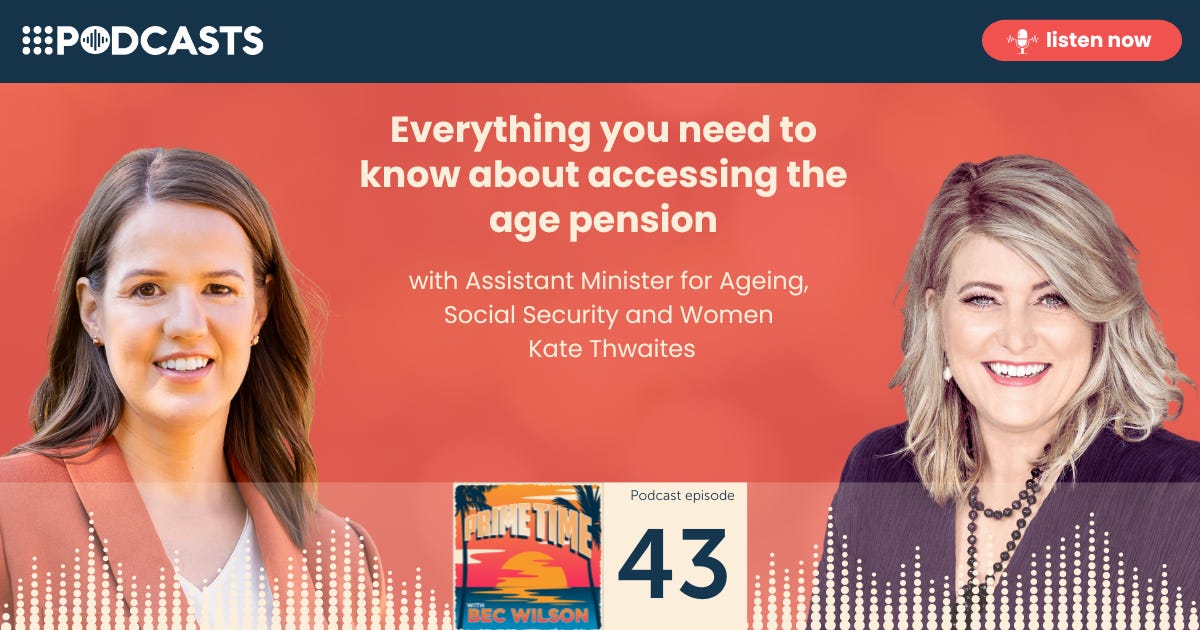What do the aged care changes mean for today's retirees?
And in today's newspapers, 'The new retirement sweet spot'
In this edition
Course: The next one kicks off 10th October 2024. Earlybird offer is open
Feature: What do the aged care changes mean for today's retirees?
From Bec’s Desk: Short and sweet
SMH/TheAge: The new retirement sweet spot
Prime Time: Everything you need to know about accessing the age pension with Assistand Minister for Ageing, Social Security, and Women, Kate Thwaites
Summer Flagship Course now on sale
Our new, Summer Edition of the How to Have an Epic Retirement Flagship Course is now open for booking. There’s a 25% early bird discount for the first 200 people so get in there and book.
This is the last course for 2024. We won’t be hosting another until late in Feb 2025.
Want to learn more or download our NEW brochure? ➡️ visit the website here
And, here’s a smart idea - Why not ask your boss to pay for it?! Quite a few of our recent attendees had asked their companies to support them doing the course. And increasingly, I’m getting asked about whether companies can offer it to their staff as a workplace benefit. Yes - they can! So can super funds!
Here’s what some of the 650+ people who’ve completed the course in 2024 already say about it (since we started them in April) .
I would recommend the course to anyone who has ever wondered whether they really know what a truly fulfilling retirement looks like, or could be. Thanks to what I learned over the six weeks I'm now looking forward to my own retirement with confidence and a sense of excitement that simply wasn't there pre-course.” -- Eve
I really liked the content it covered everything that I needed to know for my upcoming retirement. I don’t usually finish online courses but this is the first one I’ve have so that speaks to how good the content and presentations are!" – Julian
There’s lots more testimonials in the brochure. Download it here.
This week I’ve written an article about aged care and home care changes with Marcus Riley, co-founder in a new business we’re building called Age Better. Marcus has a long track record in aged care, and contributed to the government policy on the changes.
What do the aged care changes mean for today's retirees?
Most of us don’t spend much time thinking about our future aged care needs – or if we’re honest, we probably prefer not to. However, this past week has brought significant attention to the Federal Government’s proposed Aged Care Act, which, if passed, will introduce the biggest changes to the aged care system since 1997. These changes matter for two key reasons. First, more of us will need care as we continue to live longer. Second, the system has been broken for far too long, meaning market forces that typically drive quality and service have been unable to function effectively.
Before diving into the details of these changes, it’s important to note that the aged care system is essentially split into two parts: home care services and residential aged care.
With bipartisan support, the government has proposed a new approach to overhaul the entire aged care system. It’s designed to address some of the longstanding issues holding the industry back:
Clearly defining the rights of consumers and the responsibilities of service providers, so people can better navigate and understand the system.
Resetting eligibility criteria for services and the related financial arrangements.
Establishing new quality standards and giving regulatory agencies more powers to enforce them across both aged care and home care services.
These reforms aim to create a system that not only meets the growing demand but also ensures that quality and accountability are at the forefront.
The systems will look a bit different under the new scheme.
Home Care will now become known as ‘Support at Home’ - and will help many people to remain living at home as they age with a wide variety of services they need to do so. And Residential aged care will become more expensive - so we will all need to incorporate it into our retirement planning better.
Understanding Support at Home
Over the next 10 years from July 2025, Support at Home will help 1.4 million Australians to age in their homes. In fact, it will be the chosen way to access ageing support. Support at Home will provide support for:
Clinical care (e.g. nursing care, occupational therapy)
Independence (e.g. help with showering, getting dressed or taking medications)
Everyday living (e.g. cleaning, gardening, shopping or meal preparation)
Under the new system, the Government will cover the full cost of clinical care services, while individuals will contribute towards their daily living expenses and maintaining independence. The amount a person pays will be determined by the Age Pension means test and will vary significantly based on their individual situation, including the level of care they require and their specific mix of income and assets.
A lifetime contribution cap will apply across the aged care system and means no one will contribute more than $130,000 to their non-clinical care costs – whatever their means or duration of care – with every Support at Home contribution counted towards the cap.
Support at Home has eight categories of ongoing care packages with a maximum level funding of $78,000 per year. There is funding for assistive technology and up to $15,000 for home modifications in the spirit of helping people live in their own home for longer. There’s also two short term support options, one a 12 week restorative program, the other a $25,000 package to support end of life care - both really valuable additions to the program.
Understanding Residential Aged Care
In the next 40 years, the number of Australians over 65 is projected to more than double, and those over 85 are expected to more than triple. That makes getting aged care right a priority for Australia.
Here’s the reality we need to face: residential aged care is going to become more expensive under the new program. But it has to, in order for providers to attract the investment needed to improve and maintain their facilities.
You can expect residential aged care costs to rise, with higher entry fees (up to $750,000 without government approval) and the return of retention amounts (or exit fees) for those paying a Refundable Accommodation Deposit (RAD). Ouch! You’re going to need to plan for that!
The bottom line is that people should expect to pay more for quality aged care services compared to the previous system. Even with a single point of entry and a streamlined assessment process, navigating the system will continue to be complex, which is why the following advice is crucial.
So what should we be doing?
Planning is now of critical importance
Even if you don’t want to think about aged care now - it’s going to be important to invest time in understanding what’s important to you as you age. This is so that when it comes to making decisions about your own home support and aged care services you can make them based on your priorities, including where you want to live, the sort of provider you would choose, and the services you want to access.
Get financial clarity
You need to provision for home support and aged care when you plan for your retirement. Talk about it with your financial adviser – make sure THEY understand the new system and its implications. And contemplate how you’ll pay for the services you might need as you get older and keep your options open. It is much harder to discuss these things and their financial implications when you are old and in poor health.
Become more aware of your health
Make the effort to become more informed about your health is at. Do regular assessments to monitor health issues, and stay abreast of your ageing and healthcare needs - as it’s far better to be proactive than to bury your head in the sand. .
Make informed choices
If the need to access care or support is looming for you or a loved one, spend time researching what providers are going to be best for you. Go and see them, ask them questions that will give you confidence as to their quality, culture, alignment to what’s important to you.
Of course no one wants to go into aged care, ever! It is really is only something we access because we need it. In the spirit of avoiding or at least deferring a need for aged care we should be thinking about our ageing more broadly and identifying what we can do to stay happy and healthy. It starts with prioritizing our health and wellbeing. We need to tune into what our body needs, and learn what we should be doing to improve our biological age (that’s how our body feels as we grow older), and engage in activities that support our ongoing physical and mental health. Make sure we are eating well and giving our body the right fuel, maintain good habits in regard to sleep and exercise and participate in meaningful activities regularly. All these things are good for us at any age but will be especially helpful in maintaining our health and wellbeing as we get older and ultimately, it might defer our need to be part of the new aged care system for much much longer.
I’m taking a break this week - in between courses and newsletters and laying low! Sometimes it’s good to take a little downtime. So this email will be short! October is going to be a big month! I can’t wait - but I also am going to enjoy the tiny window of personal time before it arrives, hanging with my family while my daughter is home from Canada briefly.
The Epic Retirement Flagship Course kicks off on the 10th October - I had 13 boxes of books arrive for signing this week for all our course participants - they’re taking up a lot of space and I can’t wait to send them off. Get your booking in quick if you want to take advantage of the early bird 25% off price.
That’s enough from me - get out there and make it epic! Have a great week - I know I will. And if you don’t own a copy of the book get one here - what are you waiting for? 😃
Many thanks! Bec Wilson
Author, podcast host, columnist, retirement educator, and guest speaker
The sweet spot: How to get the most from your super and the pension
Extract of article published in print in The Age, The Sydney Morning Herald, Brisbane Times, WA Today on Sunday 21st September 2024.
This week, the government’s twice-yearly increase to age pension rates kicked in, giving us a good reason to pause and reconsider how we balance our sources of retirement income. Turns out, there’s a new sweet spot – the point where super earnings and the pension intersect to help you attain maximum earning capacity in retirement.
On 20 September 2024, the full pension rose to $1,144.40 per fortnight (about $29,754 per year) for single retirees, and $1,725.20 per fortnight (around $44,855 per year) for couples, combined.
The assets test caps have also increased, with the full pension now available to single homeowners with assets under $314,000 (excluding the family home), and $470,000 for home-owning couples. For non-homeowners, the limits rise to $566,000 for singles and $722,000 for couples.
The pension is a key part of many Australians’ retirement income—around 40 per cent rely on the full pension as their primary source of income, and another 24 per cent receive a part pension. It’s nothing to be ashamed of. It’s a solid and dependable income stream, and when combined strategically with your superannuation, it can set you up for a comfortable retirement.
Read on, in The Age, The Sydney Morning Herald, Brisbane Times and WA Today.
Everything you need to know about accessing the age pension
It’s a big one this week! I’ve got the new Assistant Minister for Ageing, Social Security and Women, Kate Thwaites joining me on the show to talk about this week’s age pension changes, and how the age pension might change in the years ahead.
For anyone contemplating an income from the age pension in the future - or curious about the other benefits that might be available to them as they approach retirement: The Pension Concession Card, and the Commonwealth Seniors Health Card, and Rent Assistance - this is a worthwhile listen.
LISTEN TO THIS EPISODE OF THE PODCAST HERE:
Last of all, if you haven’t read the book, you can order your copy from Amazon online and Big W online too. Or pick up a copy at your local Big W, or QBD stores.












